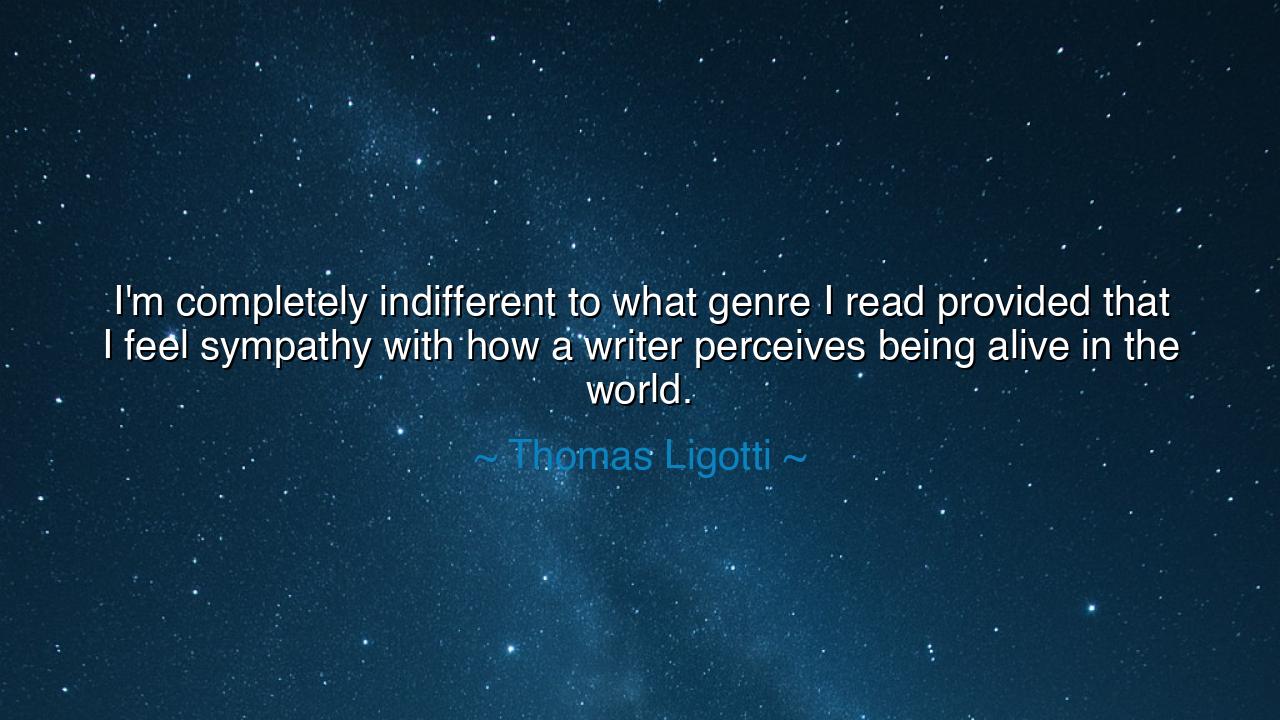
I'm completely indifferent to what genre I read provided that I
I'm completely indifferent to what genre I read provided that I feel sympathy with how a writer perceives being alive in the world.






Hear now, O seekers of meaning, the words of Thomas Ligotti, a craftsman of the dark and the uncanny, who said: “I’m completely indifferent to what genre I read provided that I feel sympathy with how a writer perceives being alive in the world.” In these words lies not only a reflection on literature, but a profound teaching on the communion between souls. For beyond the boundaries of genre, beyond the cages of labels, what matters most is whether one voice reaches out and touches another with the truth of existence.
Ligotti, a master of horror, reveals here that he does not seek merely the chill of fear or the shadow of dread when he reads. Instead, he hungers for a deeper thing: sympathy with the perception of life itself. Whether it is spoken in the language of comedy, tragedy, philosophy, or horror, it is this resonance—the echo of a writer’s vision of being alive—that holds the true power. The genre is but a vessel, a cloak; the essence lies in the heartbeat beneath.
History teaches us the same. Consider Marcus Aurelius, emperor and philosopher, who wrote his Meditations not as poetry or as fable, but as private notes. Yet his words, regardless of form, carry weight because they speak with sincerity about what it means to live, to suffer, to endure. A reader may approach them with no concern for genre, and yet they find in them an eternal sympathy, a recognition of their own struggles reflected in another soul.
So too did Shakespeare, whose works wandered freely between comedy and tragedy, history and romance. What made them endure was not the category, but the truth pulsing within: the jealousy of Othello, the ambition of Macbeth, the longing of Juliet. Across all these shifting masks, the audience felt a mirror held up to their own humanity. The genre was but the stage; the sympathy with the condition of being alive was the flame that kept the words alive for centuries.
Ligotti’s words carry also the wisdom of humility. By being “indifferent” to genre, he reminds us not to let prejudice blind us to beauty. A profound truth may hide in the simplest fairy tale; a great revelation may whisper within a crime novel or a children’s fable. If we approach all works with openness, seeking resonance rather than category, we may discover voices we would otherwise have ignored. Thus he teaches us that wisdom demands openness, and openness demands humility.
The lesson, O listener, is this: when you encounter art, do not ask first, “What is its genre?” Ask instead, “Does it reveal to me something about life, about being alive, about the struggle we share?” When you speak with others, do not judge by their appearance, their station, or their style, but ask: “Do I feel sympathy with the way they perceive the world?” For it is in this resonance, this shared recognition of existence, that true connection is found.
Therefore, live as Ligotti teaches: be indifferent to the outward labels and attentive to the inner truth. Read across all categories, listen across all voices, and search not for the trappings of form but for the sincerity of perception. For when you find sympathy with how another soul understands life, you will know that you have touched something eternal, something that transcends genre, time, and place.
And so let this wisdom endure: the true worth of a work, whether written or spoken, lies not in its genre, but in its power to make us feel less alone in the world. Seek that power, cherish it, and in turn, strive to speak and create in ways that others may find that same sympathy in you. For in this, the soul of humanity binds itself together, across centuries and across all forms of art.






AAdministratorAdministrator
Welcome, honored guests. Please leave a comment, we will respond soon